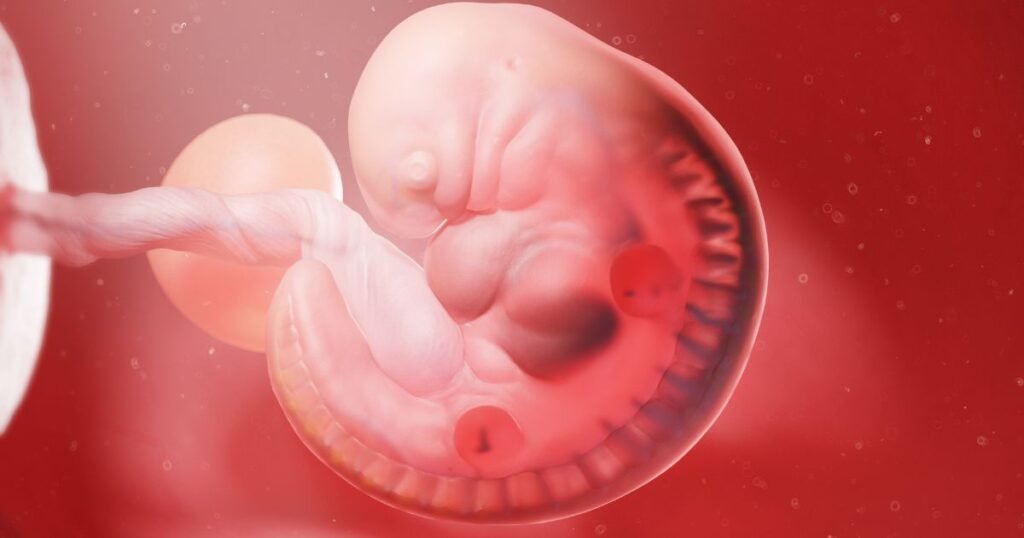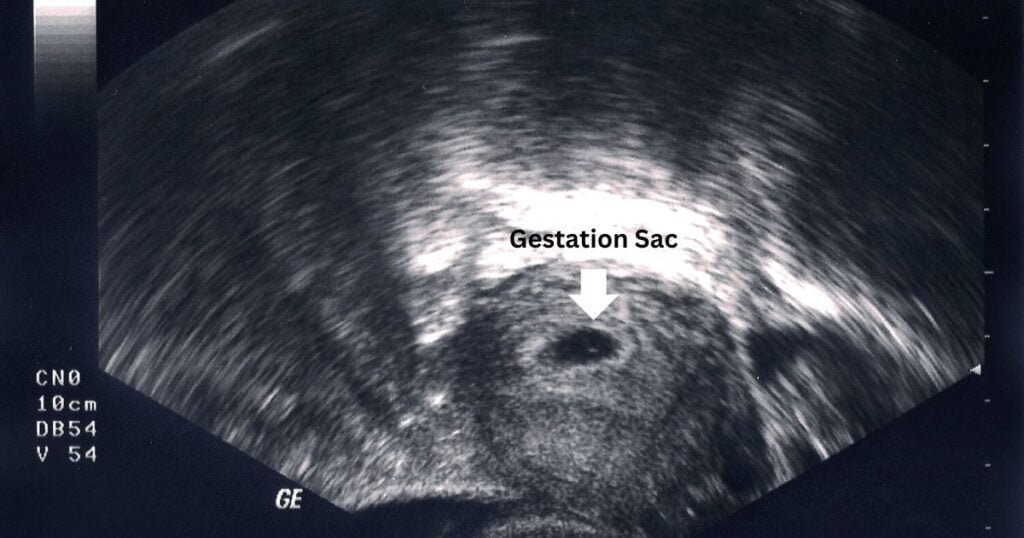Last Updated on 18 February 2024
UPDATED 19 FEBRUARY 2024
Welcome to pregnancy week by week 4! Pregnancy is a beautiful journey filled with excitement, anticipation, and numerous changes, both physically and emotionally. Whether you are trying to conceive or have just confirmed your pregnancy, understanding the different stages of pregnancy is essential for a healthy and happy journey.
One of the earliest milestones that pregnant women experience is the 4th week of pregnancy. Although the embryo is still very tiny, it is a crucial time because the fertilized egg implants into the wall of the uterus. This implantation marks the beginning of the pregnancy journey. In this article, we will explore the symptoms and development of the baby at 4 weeks of pregnancy and provide you with valuable information to navigate this early stage of your pregnancy journey.
Understanding the 4th Week of Pregnancy
The fourth week of pregnancy begins once the fertilized egg implants into the wall of the uterus. Women typically confirm pregnancy by taking a home pregnancy test, which detects the presence of pregnancy hormones in urine or blood. If the result is positive, it is an exciting indication of the early stage of pregnancy. Most women calculate their pregnancy week from the first day of their last period, which means that at 4 weeks pregnant, it has been about two weeks since conception. This early stage of pregnancy, also known as the first trimester, is a period of rapid change and development for both the baby and the mother.
The 4th week of pregnancy holds immense importance as it sets the stage for the rest of the pregnancy journey. During this week, the amniotic sac begins to form, providing protection and nourishment for the developing embryo. Early pregnancy symptoms, such as breast tenderness, fatigue, and changes in appetite, may start to manifest at this stage, indicating the progress of the pregnancy. Understanding the importance of the 4th week of pregnancy can help women make informed choices and seek appropriate prenatal care.
How to Calculate Your Pregnancy Week
Calculating your pregnancy week is essential for tracking the progress of your pregnancy journey. One of the common methods used to determine your pregnancy week is counting from the first day of your last menstrual period. This method assumes that ovulation and conception occur around the middle of your menstrual cycle, which is usually 14 days after the first day of your period.
Another useful tool in determining your due date is a due date calculator, which takes into account the first day of your last period and the average length of your menstrual cycle to estimate when your baby is due. Understanding how to calculate your pregnancy week is the first step in monitoring the development of your baby and ensuring a healthy pregnancy.
Baby’s Development at 4 Weeks
During the 4th week of pregnancy, the tiny ball of cells that formed after fertilization becomes a blastocyst. The blastocyst then implants into the wall of the uterus, marking the transition from early pregnancy to the formation of the embryo. At this stage, cells within the blastocyst differentiate to form the outer layer, middle layer, and inner layer of the embryo. Each layer has a specific role in the development of the baby’s organs, limbs, and other structures.
This progression from the blastocyst stage to the embryo stage is a crucial step in the early stages of pregnancy, setting the stage for the remarkable journey of fetal growth and development. At 4 weeks, the baby is minuscule, akin to a poppy seed, signifying the early pregnancy stage. The cell cluster denotes the initial phase of the baby’s development. A tiny yolk sac provides vital nutrients, while the mesoderm, a middle layer of the embryo, starts forming, contributing to overall development. The endoderm, an inner layer, crucially aids in the early formation of the baby’s organs.
One of the major milestones in week 4 of pregnancy is the formation of the placenta. The placenta is a vital organ that connects the developing baby to the uterine wall, allowing for the exchange of nutrients, oxygen, and waste products. Alongside the placenta, the amniotic sac begins to form. The amniotic sac serves as a protective cushion, surrounding the baby and providing a stable environment as it grows. These early developments at 4 weeks pregnant are essential for the baby’s well-being and continued growth throughout the pregnancy.
Your baby is about the size of a poppy seed
At 4 weeks pregnant, your baby is tiny—about the size of a poppy seed. While the size may be minuscule, the significance of the changes occurring within the embryo cannot be overstated. The ball of cells that represents your baby is rapidly growing, differentiating, and beginning the process of developing distinctive organ systems and features. Although the baby is not yet externally visible, the embryo is undergoing remarkable changes at this early stage of pregnancy.
The size of a poppy seed serves as a reminder of how your pregnancy journey begins, with a tiny seed of life that grows into a fully formed human being in the months ahead. Your baby’s size at 4 weeks pregnant may be small, but the potential for growth and development is immeasurable.

Expected Changes in Your Pregnant Belly At 4 Weeks
During week 4 of pregnancy, changes in your belly size may be subtle while your body is preparing for the growth of your baby. Your uterus, which was about the size of a small apple before pregnancy, will gradually begin to expand to accommodate the developing embryo. Increased blood flow to the uterus may cause a slight firmness in the lower abdomen. Hormonal changes and early embryonic development in the uterus can cause bloating and mild swelling in the abdominal area. You may also experience a tender sensation around your lower abdomen.
Your body undergoes significant changes at 4 weeks pregnant. Hormonal changes play a crucial role during this stage, with the release of human chorionic gonadotropin (hCG) being a key factor. The hCG is produced by the cells that will eventually become the placenta, and its presence in your body confirms the pregnancy. This hormone plays a crucial role in maintaining the pregnancy and ensuring the proper development of the embryo.
Other hormones, like progesterone, increase during pregnancy and contribute to the changes you may experience. These hormones support the pregnancy journey and contribute to the changes you may notice in your body. It is common to experience mood swings, fatigue, breast tenderness, and increased urination at 4 weeks pregnant. Understanding these hormonal changes can help you cope with the emotional and physical symptoms of an early pregnancy. These symptoms vary from woman to woman, and while they can be bothersome, they are often a reassuring sign that your body is adapting to the pregnancy journey.
It is important to remember that every pregnancy progresses differently, and changes in your belly size will become more noticeable as your pregnancy journey continues. Embrace and celebrate the changes your body goes through as your pregnancy journey unfolds.
Pregnancy Symptoms at 4 Weeks Pregnant
- Breast tenderness: Many women notice tenderness or sensitivity in their breasts as early as 4 weeks pregnant. Hormonal changes can cause the breasts to feel swollen, tender, or even slightly sore.
- Missed period: A missed period is one of the classic signs of pregnancy. If your period does not arrive on time, it could be an early indication of pregnancy. However, other factors, such as stress or hormonal imbalances, can also cause a missed period, so taking a pregnancy test is the best way to confirm pregnancy.
- Fatigue: Feeling more tired than usual is a common symptom of early pregnancy. Hormonal changes, increased blood volume, and the body’s effort to support the growing embryo can leave women feeling exhausted, especially in the first trimester.
- Increased urination: The increased production of pregnancy hormones can lead to more frequent trips to the bathroom. The growing uterus puts pressure on the bladder, causing the need to urinate more frequently.
- Nausea and changes in appetite: Pregnancy nausea at 4 weeks may not be fully pronounced, and some women may start to experience changes in appetite. These symptoms are thought to be caused by hormonal changes, although the exact causes of morning sickness are still not fully understood.
Less Common Symptoms at 4 Weeks Pregnant
- Ectopic pregnancy: In rare cases, the fertilized egg may implant outside of the uterus, leading to an ectopic pregnancy. This can cause symptoms such as severe abdominal pain, bleeding, and dizziness. If you experience these symptoms, it is essential to seek immediate medical attention.
- Mood swings: Hormonal changes during pregnancy can also impact your emotions, leading to mood swings. Feeling more emotional, irritable, or tearful is a common experience for many women at 4 weeks pregnant.
- Skin changes: Some women may notice changes in their skin at 4 weeks pregnant, such as increased oiliness, acne, or pigmentation changes. These skin changes are due to hormonal fluctuations and often subside after the first trimester.
- Changes in sense of smell: Heightened sensitivity to smells is another symptom that some women may experience at 4 weeks pregnant. Certain odors, such as food, perfume, or even household scents, may become more intense or even unpleasant.
Preparing for Your First Prenatal Visit
Preparing for your first prenatal visit is an exciting step in your pregnancy journey. The first prenatal visit is a chance to establish a relationship with your healthcare provider, discuss your medical history and prenatal vitamins, and address any concerns you may have. It is important to schedule your first prenatal visit at the appropriate time, typically during the first trimester, to ensure comprehensive care for you and your baby. The American College of Obstetricians and Gynecologists recommends that the first prenatal visit should ideally occur around 8 weeks of pregnancy.
The timing of your first prenatal visit is crucial to supporting a healthy pregnancy journey. Most healthcare providers recommend scheduling your first visit during the first trimester, ideally around 8 weeks of pregnancy. However, it’s important to check with your healthcare provider, as they may have different preferences. Your first prenatal visit is an opportunity to establish open communication with your healthcare provider and gather valuable information about your pregnancy journey.
During the visit, your healthcare provider may perform a prenatal ultrasound to confirm the gestational age of your baby and check for any early signs of pregnancy complications. They will discuss your medical history, including any previous pregnancies, current medications, and any health conditions you may have. This visit is also an excellent time to ask any questions you may have regarding your pregnancy, prenatal care, or any symptoms you are experiencing. It’s important to come prepared with a list of questions to ensure that you receive the information you need to navigate your pregnancy journey confidently.
4 Weeks Pregnant: Questions for Your Healthcare Provider
Remember, your healthcare provider is there to support and guide you, so don’t hesitate to ask any questions or voice any concerns you may have. Open communication is essential for a positive and informed pregnancy journey
- What prenatal vitamins should I take, and how often?
- Can you guide me on a healthy pregnancy diet and any foods I should avoid?
- When will I have my first ultrasound, and what information will it provide?
- What signs or symptoms should I watch for that may indicate a problem or potential complication?
- Are there any prenatal tests or screenings I should consider at this stage of pregnancy?
- How can I best manage the early pregnancy symptoms I am experiencing, such as morning sickness or breast tenderness?
- Do you have any recommendations for childbirth education classes or resources to help prepare for the birth of my baby?
- How often will I have prenatal check-ups, and what can I expect at each appointment?
- Can you provide a general timeline of milestones and what I can expect at each stage of pregnancy?
Nutrition And Safe Exercise During Early Pregnancy
Maintaining a balanced and nutritious diet is vital during pregnancy, and this is a great time to start considering your dietary choices. A pregnancy diet should consist of a variety of fruits, vegetables, whole grains, lean proteins, and healthy fats. These foods provide essential vitamins, minerals, and nutrients that support the growth and well-being of your baby. It’s also important to incorporate prenatal vitamins into your daily routine, as they help fill any nutritional gaps and provide the necessary nutrients for a healthy pregnancy.
Adequate intake of essential vitamins and nutrients, such as folic acid and vitamin D, is crucial for the proper development of your baby. Including folic acid in your diet, either through a prenatal vitamin or by consuming foods rich in this nutrient, can help prevent neural tube defects. Vitamin D, on the other hand, supports the body’s ability to absorb calcium, promoting strong bones and teeth for both the mother and the baby. Consult your healthcare provider or a registered dietitian to provide a personalized recommendation based on your specific needs.
Checklist For Pregnancy Week by Week 4
Creating a pregnancy checklist at 4 weeks pregnant can help you stay organized and prepared as you journey through pregnancy. The checklist may include essential items such as prenatal vitamins, comfortable maternity clothing, a pregnancy journal, and books, or resources on pregnancy and childbirth. As your pregnancy progresses, you can continue to add items to your checklist, ensuring that you have everything you need for a healthy and comfortable pregnancy journey.
- Confirm your pregnancy with a home pregnancy test.
- Schedule your first prenatal visit with a healthcare provider.
- Begin tracking your pregnancy journey in a journal, noting any symptoms or changes you experience.
- Prenatal vitamins: These vitamins are specifically formulated for pregnant women and contain the essential nutrients needed for a healthy pregnancy, including folic acid, iron, and vitamin D.
- Birth defect prevention: Ensure that your diet includes foods rich in folic acid, such as leafy greens, citrus fruits, and fortified cereals. Studies have shown that adequate folic acid intake can help prevent neural tube defects in the baby.
- Maternity clothing: Invest in comfortable, supportive clothing that will accommodate your changing body throughout pregnancy. Look for options with adjustable waistbands, stretchy fabrics, and nursing features, if applicable.
- Birth plan and preferences: Start thinking about your birth plan and discuss your preferences with your healthcare provider. Consider the type of birth experience you desire, pain management options, and any specific requests you have regarding your prenatal care and the birth of your baby.
- Reliable sources of information: Gather a collection of credible sources of information on pregnancy and childbirth, such as books, websites, or apps, to guide you through your pregnancy journey.

Ultrasound image of a 4-week embryo
In conclusion, understanding the development and symptoms of pregnancy at 4 weeks is crucial for expectant mothers. It is essential to calculate your pregnancy week accurately and be aware of the changes happening in your body.
While common symptoms like fatigue and hormonal changes are expected, it is important to consult with your healthcare provider about any concerns or questions you may have. Don’t forget to take care of your physical and mental well-being through a balanced diet, safe exercises, and self-care activities. As you embark on this journey, make sure to check off the necessary items on your checklist and schedule your first prenatal visit. Stay informed and enjoy the miraculous journey of pregnancy!









